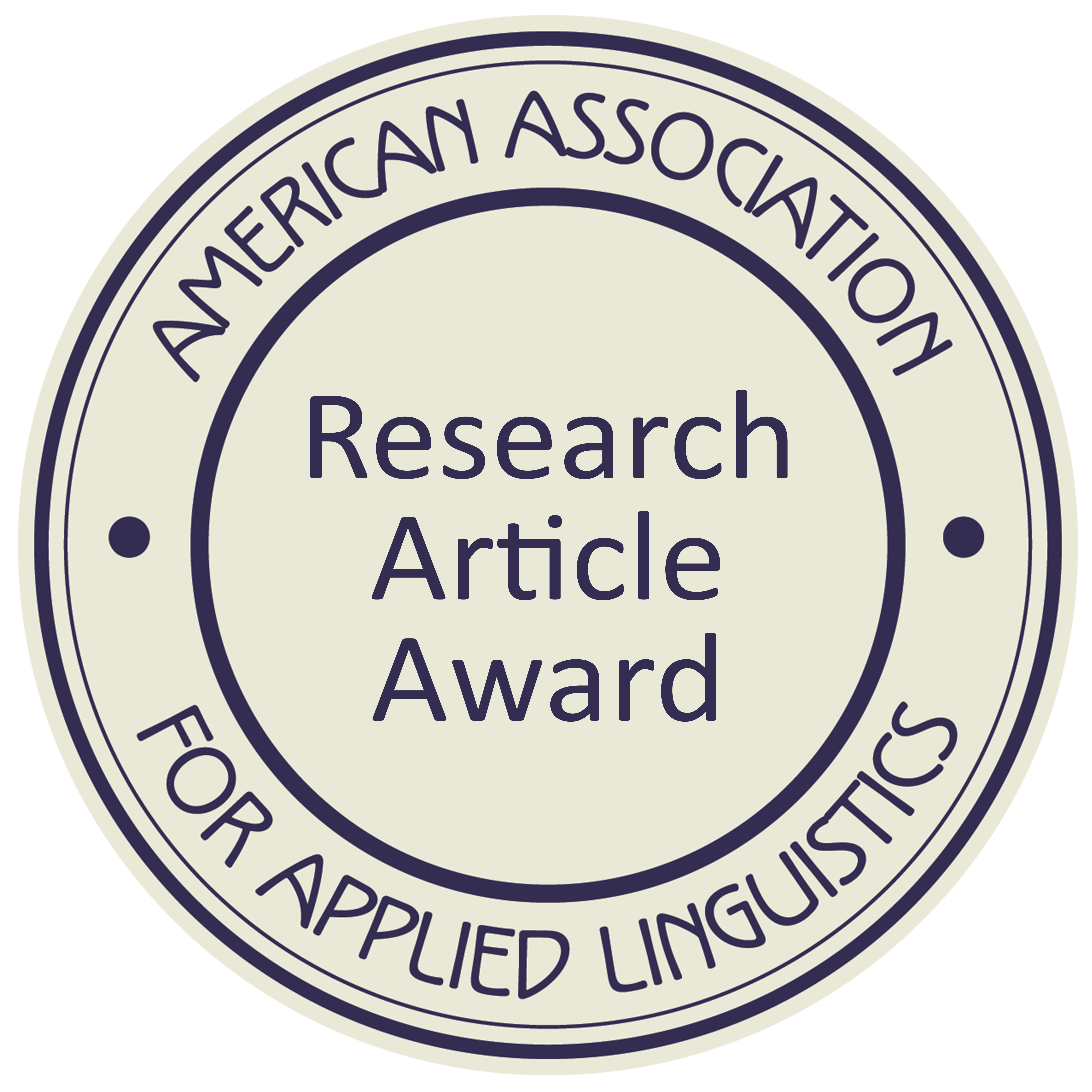Research Article Award
2026

The AAAL Research Article award is bestowed annually upon the author or authors of a published refereed journal article which is recognized by leaders in the field to be of outstanding quality and to hold the broadest potential impact on the advancement of applied linguistic knowledge. This is a non-cash award consisting of a certificate presented to the author (a certificate will be presented to each author if the winner is a multi-authored article). The 2026 award nomination is closed.
Criteria for Evaluation
The article must meet the highest standards in social sciences or humanities research and advance applied linguistics knowledge. The award selection criteria include:
- Significance of the problem being addressed. The issues investigated are important to the field of applied linguistics and the study advances knowledge in an area that is highly valued by the research communities of AAAL.
- Use of compelling theory and cumulative research base. The literature review is well crafted, appropriately invoking or even innovating theories, and demonstrating a deep understanding of the relevant accumulated research.
- Strength of research design. The study is well designed and follows the highest standards of inquiry for qualitative, quantitative, or mixed methods, employing instruments, techniques, and procedures that are rigorous and appropriate for the research questions posed.
- Appropriateness of interpretations. The interpretations are well-grounded in the evidence and the limitations are discussed.
- Completeness of reporting. The level of detail of the reporting enables replication and/or theory building, as appropriate.
- Clarity and engagement of writing style. The article (including tables, figures, appendices, and supplementary online materials, if applicable) is well written, in a style that is both clear and engaging, such that readers’ level of understanding and interest is high.
- Promise for inspiring future research directions. The study holds great potential to serve as a model for future research; it offers new ways to conduct research or new research questions to explore.
- Attention to context. The authors show a sophisticated awareness of the constraints and affordances that the specific local context of the research brings for the study.
- Potential to have an impact on language-related human and world problems. The study makes a contribution to knowledge about language that holds the potential for improving the conditions of individuals, groups, and/or societies in the world, beyond the research.
- Attention to vulnerable, disadvantaged, or under-researched populations. In their study, the authors show sensitivity towards vulnerable or disadvantaged populations or populations less frequently examined in the research, and as a result, the study strengthens the field’s capacity for building knowledge that is beneficial to such populations.
Instructions for Submission of Nominations:
- We call for outstanding research articles published during the current or previous calendar year. Articles submitted in 2025 (for the 2026 award), must have been published in 2024 or 2025.
- Articles published online or in print are eligible for nomination. However, articles may only be nominated once.
- Candidate articles may only be nominated by editors of peer-reviewed journals published within or outside of North America (both print and on-line and both inside and outside the field of applied linguistics); each journal may submit one nomination per award cycle.
- Eligibility is not limited to articles whose authors who are AAAL members.
Evaluation Procedures
The Award Committee members will rate and rank the research articles submitted in a given year and then report their final decision to the Executive Committee. At the discretion of the Award Committee, the award may or may not be presented during a given year. A reason not to make an award would be an insufficient number of nominations or no nominated article that meets the excellence expected.
For questions about the Research Article Award, email info@AAAL.org.
Recipients
2025
Alastair Henry (2023) Multilingualism and persistence in multiple language learning. The Modern Language Journal (Vol 107, Pg 183-201).
2024
Yalda M. Kaveh, Katie A. Bernstein, Claudia Cervantes-Soon, Sara Rodriguez- Martinez & Saida Mohamed (2022) Moving away from the 4-hour block: Arizona’s distinctive path to reversing its restrictive language policies. International Multilingual Research Journal, 16:2, 113-135
2023
Engman, Mel M., Hermes, Mary (2021) Land as interlocutor- A study of Ojibwe learner language in interaction on and with naturally occurring 'materials.' Modern Language Journal, 105 (Supplement), 86–105.
2022
Lorenzo, F., Granados, A., & Rico, N. (2020). Equity in bilingual education: socioeconomic status and content and language integrated learning in monolingual Southern Europe. Applied Linguistics, 42(3), 393–413.
2021
Pavlenko, A., Hepford, E., & Jarvis, S. (2019). An illusion of understanding: How native and non-native speakers of English understand (and misunderstand) their Miranda rights. International Journal of Speech, Language & the Law, 26(2), 181-207.
2020
Winke, P., Lee, S., Yoon, H-J., Ahn, J. I., Choi, I., & Cui, Y. (2018). The cognitive validity of child English-language tests: What young language learners and their native-speaking peers can reveal. TESOL Quarterly, 52(2), 274-303.
2019
“From Early Starters to Late Finishers? A Longitudinal Study of Early Foreign Language Learning in School” by Nils Jaekel, Michael Schurig, Merle Florian, and Markus Ritter as published in the journal Language Learning (Vol 67, pp. 631-664).
2018
Schepens, J., Van der Slik, F., & Van Hout, R. (2016). L1 and L2 distance effects in learning L3 Dutch. Language Learning, 66, 224-256. :10.1111/lang.12150
